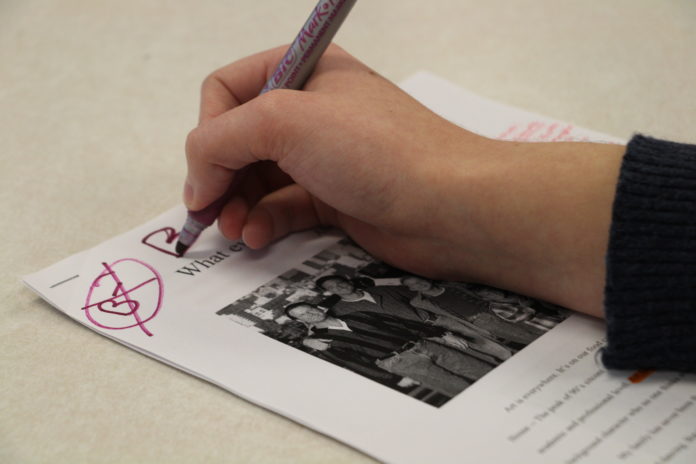Sophie Berning
Usually it is believed that each grade received on the top of an assignment is final, but some teachers have methods that would say otherwise.
Discussing or debating a grade on an assignment is a privilege that many teachers allow in their classrooms. History teachers, Steve Smith and Rhonda Ireland, and English teacher, Lori Mosier, all support the idea of giving a student the chance to discuss their grades on assignments.
“I do allow students to discuss with me why they may have felt unjustly graded on an assignment or project,” said Mosier. “If they can show me how they did meet all expectations, then I am happy to change the grade. We are all human and can sometimes make mistakes.”
Smith also believes that “teachers aren’t infallible. We do make mistakes.” While the teacher could be the one at fault, senior Tim Nguyen believes that it is up to the students to notice and speak up if something looks wrong.
“It is more on the student’s part if they are curious about what they miss and what they can glean from that to improve for next time,” said Nguyen. Some students feel that their teacher might not like them or favorite others, causing them to be graded unfairly.
Nguyen said that sometimes he feels “inwardly graded unfair,” but that it doesn’t mean it’s okay to complain about the grade. Instead Nguyen said that he uses his grade “as motivation in everything I do. I try to give 110 percent.”
The most commonly brought up issue that comes with allowing students to discuss why they got a certain grade on assignments is the idea that students will take it for granted. Not using it as a time to learn, but a time to argue about their grade in hopes of getting more points.
“To me, the only problem with it is when some students want to argue about every little thing. Then it’s not a thinking process and an exchange of ideas, but a whining for more points,” said Smith.
However, Smith said he sees right through those students, even though there are only a few of them. “I don’t think most students argue for the points because it will raise their grade, but because they sincerely believe that they are correct. There are, of course, some who just want one more point to get an A- instead of a B+. Their arguments are usually not very well thought out,” said Smith.
Teachers such as Smith, Mosier and Ireland all allow their students to talk with them about how they were graded and why did or didn’t receive each point. They do encourage their students to use this time if they have questions so they can clear the air about the student’s grade. Ireland said, “it allows a chance to explain my marks in a one on one setting as well as clear up any confusion a student may have.”
Each student is in charge of their own learning and standing up when they believe a mistake is made is a part of this learning. Mosier said that if a student has a valid reason for a grade change than they should speak up and make it known to their teacher.
Many teachers at West allow students to spend time debating their grades with them as long as the arguments are made valid. But this time should not be seen as a time for trying to get more points on an assignment, but a time to ask questions and clarify because teachers can make mistakes.














